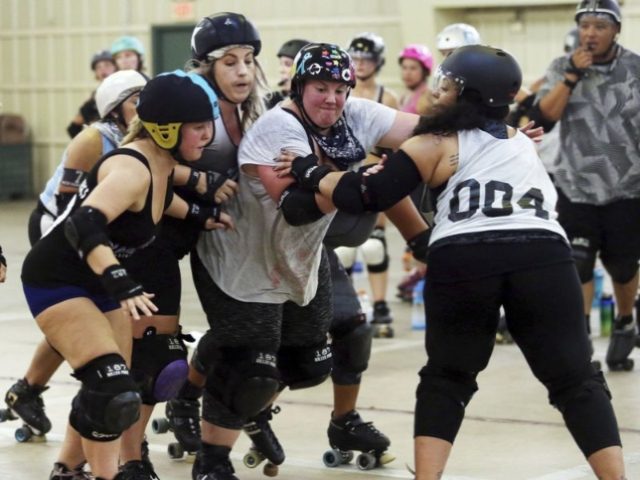Transgender women (biological males) are apparently working their way into the once all-female sport of Roller Derby, and some female competitors are worried about their safety on the boards.
Because it is a full-contact sport, Roller Derby has always been a wholly segregated sport. In the past, it was logically understood that women would not fare well physically against more powerful men in the rough and tumble sport. But now, all that going by the wayside as Roller Derby rushes to PC itself by allowing men claiming to be transitioning into women to join the sport.
According to the advocacy group Fair Play for Women, men are trying to invade Roller Derby, especially in the UK leagues.
Boiled down, Roller Derby is a points game where “jammers” push through a pack of skaters and skate a full lap to reenter the pack. They get points for every opposing team member they pass during the lap. But the physical part comes as the “blockers” physically block the “jammers” to keep them from scoring, and that is where the tough, physicality comes into the game.
Now, imagine if skaters who are physically men are the blockers trying to stop the natural-born female jammers? The jammers wouldn’t stand a chance pushing past their stronger and faster biologically male opponents.
Despite that, leagues all across the UK are falling all over themselves (literally) to appear welcoming and tolerant to transgenders by allowing men claiming to be women to join the leagues.
“Effectively, it is no longer an exclusively female sport,” Fair Play for Women says, adding:
Leeds Roller Derby declares itself ‘open to all female-identifying and non-binary skaters.’ Sheffield Steel Roller Derby says, ‘We welcome all self-identifying women’ while Belfast Roller Derby is ‘open to anyone who identifies as a woman or gender expansive.’ Edinburgh’s Auld Reekie league says, ‘those who identify as women (cisgender, transgender and intersex) or gender expansive may train and compete as skaters.’ London Roller Derby asserts, ‘increasing awareness of gender identities…we need to be more inclusive of our trans teammates.’
This move to increase ‘inclusivity’ is at the heart of the WFTDA gender policy which has been adopted by the UKRDA. It says “an individual who identifies as a transwoman, intersex woman, and/or gender expansive may skate with a WFTDA charter team… ‘
But some natural-born female contestants are becoming worried about their safety.
One female Roller Derby player told the group that she was blackballed from the Canadian Roller Derby league after becoming alarmed for her safety on the track and then being vocal against allowing men to join the leagues.
“They’re built like men because they have male bodies,” Kate Hansen said about allowing transgender players to compete against natural women. “Women who sign up to play women’s roller derby expect to be playing women.”
It wasn’t long before her outspoken opposition to transgender players was turned against her, and she was banned from the leagues for being a “bigot.”
Another Canadian player, Lara Kendall, agreed with Hansen. “The biological strength of men alone gives them an advantage, and the patriarchy affords social and financial advantages for men that keep the top positions male-dominated. I play roller derby and men in female sports teams is not fair,” she said.
At least two recent studies support the players in their opinion that transgender athletes are still physically men with all the requisite strength, power, speed, and musculature.
A recent study by researchers at New Zealand’s University of Otago concluded that men claiming to be transgender women do not lose their male strengths despite testosterone loss, hormone therapy, and transgender surgeries.
The researchers concluded that “healthy young men did not lose significant muscle mass (or power) when their circulating testosterone levels were reduced.”
Another study found agreed that transgender transitioning procedures do not obviate a male body’s strengths.
A study conducted by the Swedish Karolinska Institute and Linkoping University found that even after a full year of hormone therapy, transgender women still retain their male strength and muscle mass.
“Despite the robust increases in muscle mass and strength in TM, the TW were still stronger and had more muscle mass following 12months of treatment,” the researchers found. “These findings add new knowledge that could be relevant when evaluating transwomen’s eligibility to compete in the women’s category of athletic competitions.”
Follow Warner Todd Huston on Twitter @warnerthuston.

COMMENTS
Please let us know if you're having issues with commenting.